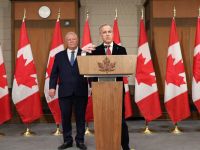Khalifa University holds graduation for future nuclear experts
Khalifa University’s Gulf Nuclear Energy Infrastructure Institute (GNEII) hosted a two-day symposium on nuclear safety, security and safeguards at Khalifa University’s Abu Dhabi campus. Held on October 9th and 10th, the event also witnessed the graduation ceremony for the 18 fellows who participated in the GNEII program.
The symposium was opened by H.E. Ambassador Michael H. Corbin, The United States of America Ambassador to the UAE, and was attended by representatives from US Department of Energy, US Department of State, Texas A&M, Sandia National Labs and the International Atomic Energy Agency (IAEA). Dr. Tod Laursen, President of Khalifa University, and Dr. Mohammed Al Mualla, Senior Vice President for Research and Development, also attended the event on behalf of the University.
The event also attracted representatives from local entities such as, the Emirates Nuclear Energy Corporation (ENEC), the Federal Authority for Nuclear Regulation (FANR), and Critical Infrastructure and Coastal Protection Authority (CICPA).
Eleven Capstone projects were presented by the GNEII fellows at the symposium as well. The Capstone projects represent the culmination of the 16 week GNEII course for the 26 fellows, who come from five different countries. Four of the Capstone Projects will be published in international journals.
Abdelaziz Al Madhloum, Manager for GNEII, said “Khalifa University wishes to congratulate the graduating fellows, and to thank our esteemed guests for attending the graduation and the symposium. Programs like GNEII are vital to furthering the region’s quest to develop a peaceful nuclear program, as well as, become an intellectual and academic hub in the Gulf area. During the 16 week-program, the fellows went through over 216 hours of instructions covering more than 6000 slides of information.”
He continued “GNEII’s mission is to develop a responsible nuclear energy culture and institutionalize key safety, security and nonproliferation norms in the future decision-makers of the Gulf region nuclear energy programs by providing professional development and training events like this one.”
A key note address on a “Culture of Safety” was given by a senior member from ENEC, as well as, a presentation by Dr. Ali Boussaha from IAEA on the IAEA’s Technical Cooperation Department activities in the Middle East, and a discussion on "3S integration in nuclear regulation in UAE" by Dr. Christer Viktorsson, Deputy Director General of FANR. GNEII alumni, Mr. Wael Al Hashimi, who is currently working with CICPA, also gave a speech to the graduates.
GNEII is the result of a partnership between Khalifa University, Sandia National Laboratories (Sandia) and Texas A&M University’s Nuclear Security Science and Policy Institute (NSSPI). It was designed to give future nuclear energy leaders the necessary knowledge to support them in future decision making processes by providing an enhanced understanding of the safety, safeguards and security aspects of nuclear energy, as well as, offering the international community a model for an educational institute that addresses the integrated 3S (safety, safeguards and security) methodology.
Background Information
Khalifa University of Science, Technology and Research
The newly-established Khalifa University of Science and Technology (KU) combines the Masdar Institute of Science and Technology (MI), the Khalifa University of Science, Technology and Research (KUSTAR) and the Petroleum Institute (PI) into one world-class, research-intensive institution, seamlessly integrating research and education to produce world leaders and critical thinkers in applied science and engineering. Khalifa University endeavors to be a leader among research intensive universities of the 21st century, while catalyzing the growth of Abu Dhabi and the UAE’s rapidly developing knowledge economy.






